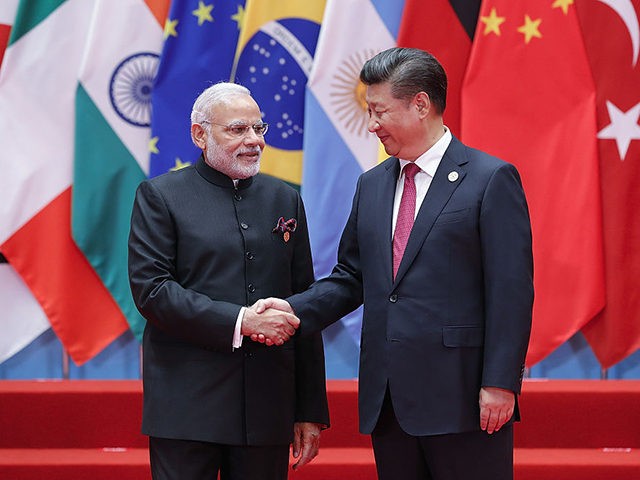The Chinese Communist Party (CCP) — which viciously opposed travel bans during the early days of the coronavirus pandemic, when its actions ensured the Wuhan coronavirus would infect the rest of the world — on Thursday agitated for isolating its regional rival India from the rest of the world to contain its coronavirus outbreak.
China’s state-run Global Times portrayed India’s neighbors in Nepal, Bangladesh, Myanmar, and Sri Lanka as trembling fearfully in the shadow of India’s coronavirus wave, noting approvingly that Sri Lanka has closed its border with India and several South Asian countries have imposed India travel bans.
“The ‘double mutant’ variant that is wreaking havoc in India is feared to be spilling into neighboring countries and is starting to affect Southeast Asia. Experts warned that without strict border controls and anti-virus measures, countries in South and Southeast Asia would fall into a grave situation, given their weak medical systems and lack of vaccines, and they suggested antivirus cooperation with China may be helpful,” the Global Times wrote.
“To reduce infections, South Asian countries should strengthen border controls and limit personnel exchanges with India. They should also take strict measures domestically — offering medical observations to close contacts and promote vaccinations,” the CCP paper advised, quoting a Chinese Academy of Social Sciences researcher.
This is very different from how China demanded it should be treated when the Communist Party unleashed the Wuhan coronavirus upon the world. The Chinese government, and its political and medical proxies, argued vociferously that restricting travel from China was unscientific and unnecessary, or even counter-productive.
The China-influenced World Health Organization (W.H.O.) in early 2020 lectured that bans against travel from China would “have the effect of increasing fear and stigma, with little public health benefit,” to quote Director-General Tedros Adhanom Ghebreyesus in January.
By February, W.H.O. was chiding travel-ban proponents for indulging in superstition and assuring the world that China had the coronavirus well under control, with a “significant decrease in cases” in the outbreak region of Hubei province. For good measure, W.H.O. told travelers they shouldn’t bother with masks, because “there is no evidence that wearing a mask – of any type – protects non-sick persons.”
The Chinese lashed out at the Trump administration, and countries like Italy, for temporarily restricting travel from China.
“We hope countries will respect the professional and authoritative advice of the W.H.O., maintain normal economic cooperation, trade and people-to-people exchanges … and stop overreacting and fearmongering,” sneered Chinese diplomat Xie Feng.
The Chinese Foreign Ministry lodged formal complaints with nations that restricted travel when the coronavirus came roaring out of Wuhan. Foreign Ministry spokeswoman Hua Chunying said her government “deplored and opposed” nations that banned China travel.
“Their actions, which sowed panic among the public, will not help prevent and control the epidemic. They have gravely disrupted normal personnel exchanges, international cooperation, and order of the international market for air transportation,” Hua said in February 2020.
China did not hesitate for an instant to impose travel bans on other countries when it felt threatened by a resurgence of the coronavirus later in 2020 and 2021. Chinese travel bans were sweeping and draconian, imposed with little advance notice and no apology.
Trump’s domestic political opponents, including Joe Biden, smeared travel bans as unreasonable and motivated by xenophobia. Biden, now in the White House, banned most travel from India last week.

COMMENTS
Please let us know if you're having issues with commenting.